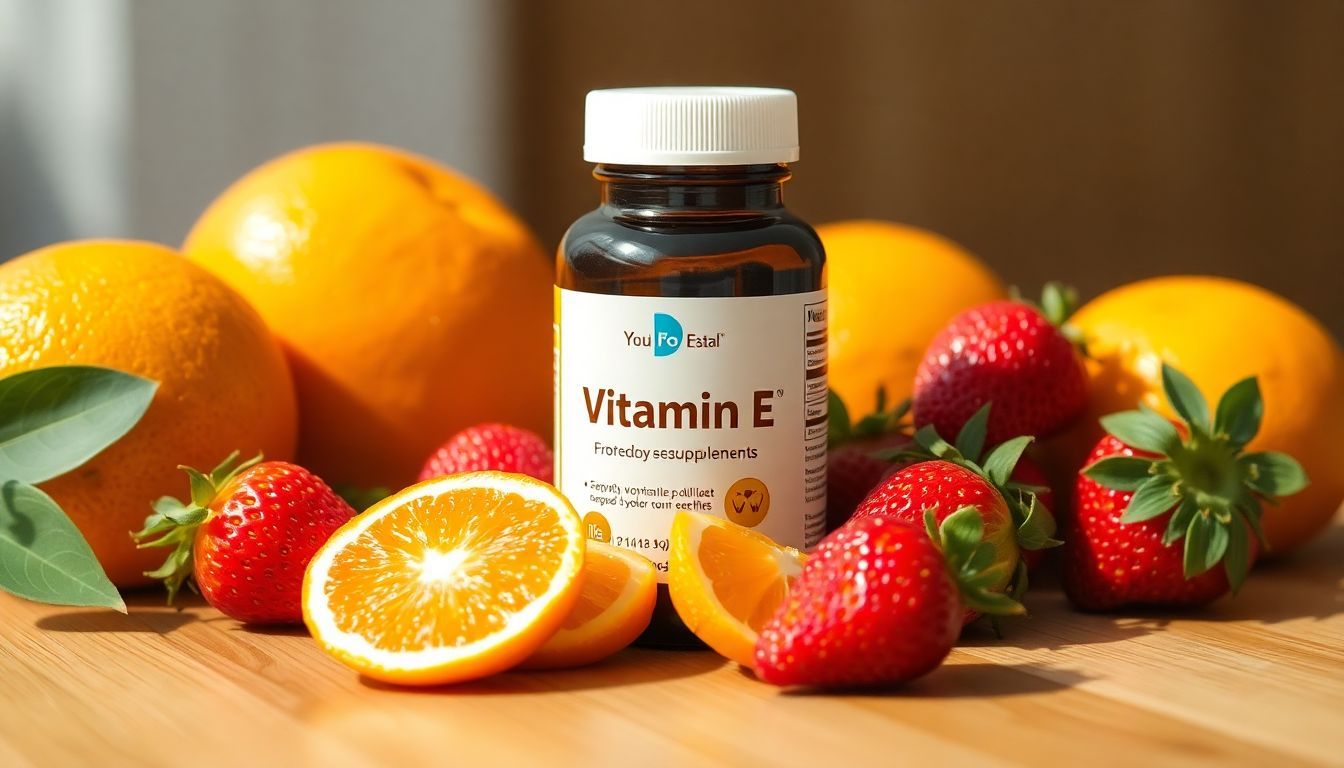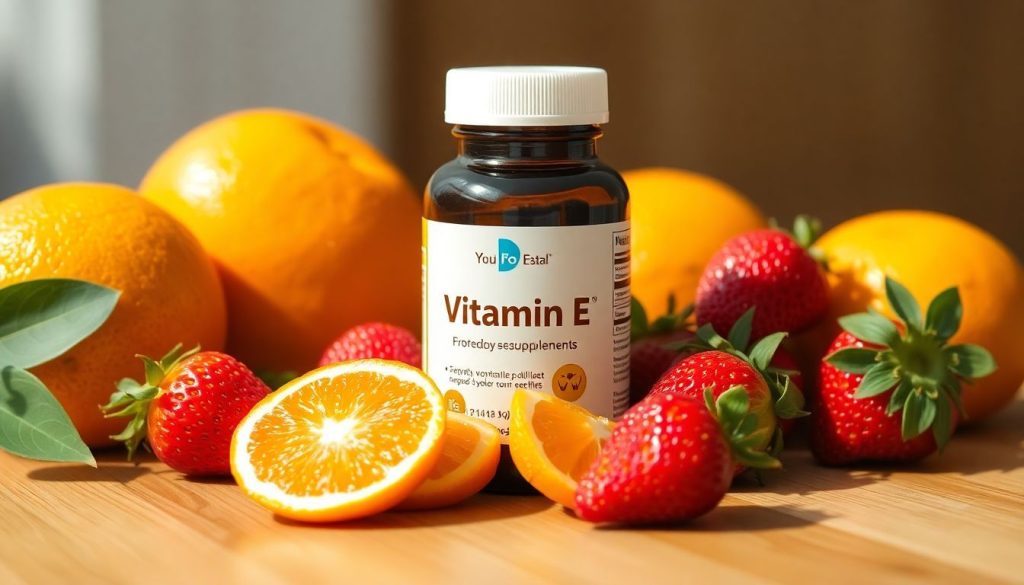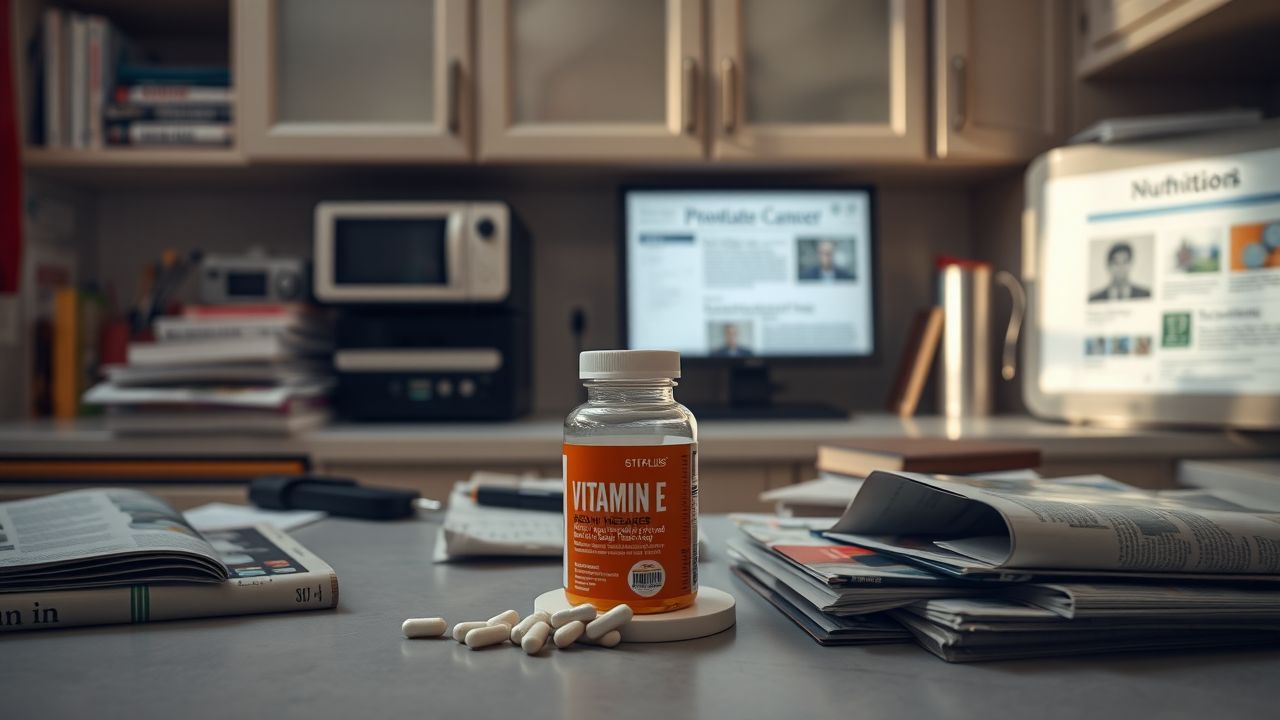Many people think taking vitamin E can protect against prostate cancer. Research now shows that this isn’t true and may even increase the risk. This blog explains why vitamin E doesn’t help, what studies found, and what you should know about supplements.
Thank you for reading this post, don't forget to subscribe!Keep reading to uncover the facts!
Key Takeaways
- Studies like the 2011 SELECT trial found that men taking 400 I.U. of Vitamin E daily had a 17% higher risk of prostate cancer compared to those on placebos.
- Research showed no proof that Vitamin E supplements prevent prostate cancer, contradicting early hopes from small trials in the 1990s.
- High doses of Vitamin E may act as pro-oxidants, causing cell damage instead of offering protection against cancer.
- Dietary guidelines now recommend avoiding high-dose Vitamin E supplements and focusing on a balanced diet with whole foods for better health.
- Gamma-tocopherol (a type of Vitamin E) shows some potential but needs more research, especially compared to alpha-tocopherol used in most studies like SELECT.
Overview of Vitamin E and Its Historical Context in Cancer Prevention
Vitamin E once sparked interest as a potential shield against cancer. Early studies suggested it might lower risks, leading to widespread use in supplements.
The initial hypothesis linking Vitamin E to reduced cancer risk
Early research in the 1990s suggested that antioxidants, like vitamin E, could protect cells from damage. This idea led scientists to explore if vitamin E might reduce cancer risk by preventing oxidative stress—a factor linked to cell mutations and tumor growth.
Studies showed some promise at first. Small trials hinted that vitamin E supplements had protective effects against certain cancers. This raised hopes for its role in prostate cancer prevention and encouraged larger clinical trials to test these claims further.
Antioxidants were seen as a shield—protecting cells from harm caused by free radicals.
Key studies that shaped early beliefs
The ATBC Cancer Prevention Trial studied alpha-tocopherol, a form of Vitamin E. It showed a 32% drop in prostate cancer cases among men who took it. Yet, the study had flaws that made its claims less solid.
Researchers couldn’t directly link Vitamin E to this result because other factors may have played a role.
Animal tests and lab studies also suggested benefits of antioxidants like Vitamin E. These findings raised hopes for stopping cancer before it started. Many thought vitamin supplements could cut risks based on these early results—especially for prostate cancers or advanced forms—but real-world evidence was limited at the time.
The Turning Point in Research
Research shifted when a major clinical trial showed unexpected results. These findings challenged earlier thoughts about Vitamin E and prostate cancer.
The SELECT trial findings
The SELECT trial tested if vitamin E or selenium could stop prostate cancer. This large, randomized study started in 2001. Researchers stopped it early in 2008 because no protective effects were found.
Instead of helping, vitamin E appeared to harm.
By 2011, data showed a 17% higher risk of prostate cancer among men taking only vitamin E versus placebo pills. Over seven years, this meant 11 more cases for every 1,000 men who used the supplement.
High selenium levels also raised the chance of high-grade prostate cancer—contradicting old ideas about its safety.
Subsequent studies challenging previous claims
In 2008, researchers reported no link between vitamin E supplements and reduced prostate cancer risk. This came from the Selenium and Vitamin E Cancer Prevention Trial (SELECT). Later analysis in 2011 showed troubling news.
Men taking 400 IU of vitamin E daily for years had a 17% higher chance of getting prostate cancer compared to those on placebo pills. These results surprised many who once thought antioxidants like vitamin E were protective.
Experts believe this rise isn’t random. High doses of vitamin E may harm instead of help. Some suggest it could act as a pro-oxidant at high levels, increasing cell damage rather than preventing it.
Dr. Eric Klein from Cleveland Clinic now warns against these supplements unless necessary. Researchers also study genetic factors that might explain why some men are more affected than others by such risks.

Vitamin E Intake and Prostate Cancer Risk: A Meta-Analysis
Recent studies looked at how Vitamin E affects prostate cancer risk. The results showed no strong proof that it helps prevent the disease.
Overall findings from recent meta-analyses
Recent meta-analyses provide a comprehensive look at how Vitamin E intake relates to prostate cancer risk. Here’s a summary of the findings in table format for clarity:
| Type of Vitamin E | Relative Risk (RR) | Confidence Interval (95% CI) | Key Observations |
|---|---|---|---|
| Dietary Vitamin E | 0.97 | 0.92 – 1.02 | No significant association with prostate cancer risk. |
| Supplemental Vitamin E | 0.99 | 0.94 – 1.04 | No significant impact on prostate cancer risk. |
| Supplemental Vitamin E (European Studies) | 0.81 | 0.69 – 0.97 | Suggested reduced prostate cancer risk in Europe. |
Data showed no overall significant benefit from Vitamin E intake, whether dietary or supplemental. A notable exception came from European studies. There, supplemental Vitamin E appeared to lower prostate cancer risk (RR = 0.81). Statistical heterogeneity was low to moderate across studies (I2 range: 0-34.64%), supporting consistent findings in this subgroup.
Analysis of high-dose Vitamin E impacts
High-dose vitamin E was expected to lower prostate cancer risk, but it did the opposite. The SELECT trial showed men taking 400 IU of vitamin E daily had a 17% higher chance of developing prostate cancer over seven years compared to those on placebo.
This means 76 cases per 1,000 men in the vitamin E group versus 65 in the placebo group.
The trial stopped early because of these results. Researchers warned against using high doses of vitamin E supplements due to this increased risk. The findings shifted focus from prevention toward understanding how such doses might harm rather than help.
Mechanisms Proposed for Why Vitamin E Does Not Prevent Prostate Cancer
High doses of Vitamin E may act as a pro-oxidant instead of an antioxidant, leading to cell damage. This effect could explain why it fails to block prostate cancer growth.
Lack of effect on cancer cell growth
Vitamin E showed promise in early lab tests and animal studies. It slowed prostate cancer cell growth in these settings. But this success didn’t happen in humans. Clinical trials like SELECT revealed no reduction in prostate cancer risk with vitamin E intake.
The antioxidant was once thought to stop oxidative damage linked to cancer cell growth. Yet, the complex nature of human biology may explain its failure. Prostate cancer cells might resist or rely on mechanisms that vitamin E cannot block effectively.
Possible pro-oxidant effects at high doses
High doses of Vitamin E, especially over 400 I.U. daily, may act as a pro-oxidant instead of an antioxidant. This can lead to damage in the body by increasing oxidative stress rather than reducing it.
Researchers suspect this effect worsens cell behavior and possibly encourages cancer growth in some cases. Genetic factors might also play a role in how the body processes these high levels, making certain individuals more at risk for issues like prostate cancer.
Dr. Eric Klein warns against high-dose Vitamin E supplements due to such risks and lack of proven benefits.

Comparative Analysis of Vitamin E with Other Nutrients
Vitamin E is often compared to other antioxidants like selenium and vitamin C. Some combinations show promise, while others may lead to unexpected outcomes.
Comparison with selenium and other antioxidants
When discussing prostate cancer prevention, selenium and other antioxidants like Vitamin E often come up. Each plays a role in reducing oxidative stress. But their impacts on cancer prevention vary.
Here’s a quick comparison:
| Nutrient | Role in Cancer Prevention | Key Findings | Risks |
|---|---|---|---|
| Selenium | Reduces oxidative stress by neutralizing free radicals. | – Mixed results in clinical trials. – SELECT trial: No significant impact on prostate cancer prevention. – May work better in combination with other antioxidants. | Linked to an increased risk of type 2 diabetes at high doses. |
| Alpha-Tocopherol (Vitamin E) | A common antioxidant that protects cells from damage. | – Early studies suggested cancer prevention benefits. – SELECT trial: No reduction in prostate cancer risk. – High doses may not offer protection. | High doses might act as pro-oxidants, potentially increasing cancer risk. |
| Gamma-Tocopherol (Vitamin E Type) | A less common form of Vitamin E, often overlooked. | – May have stronger anti-inflammatory effects. – Possibly more effective against cancer cell growth than alpha-tocopherol. | Limited data; requires further research. |
| Other Antioxidants | Includes compounds like Vitamin C and polyphenols. | – Some show protective effects. – Require combination with other nutrients to work effectively. – Limited efficacy on their own for prostate cancer prevention. | Overuse may cause imbalances or reduced effectiveness. |
Selenium and Vitamin E, studied together in the SELECT trial, failed to offer significant prostate cancer protection. Gamma-tocopherol shows promise but needs more research. High doses of antioxidants or improper combinations can even pose risks.
Insights from combination supplement studies
The SELECT trial studied over 35,000 men. It tested selenium and vitamin E alone and together. No reduction in prostate cancer risk was seen with either supplement. Surprisingly, the combination did not increase risks but showed no added benefits.
Selenium might lower some of vitamin E’s harmful effects when taken together. High doses of vitamin E (400 I.U. daily) raised prostate cancer risk by 17%. This result highlights the need for caution with dietary supplements like these two minerals or antioxidants used together for prevention efforts.
Implications for Public Health and Dietary Recommendations
Public health guidelines have shifted based on new findings about Vitamin E and prostate cancer. Experts now emphasize balanced diets with whole foods instead of relying on supplements for disease prevention.
Changes in dietary guidelines
Dietary guidelines now stress eating whole foods rather than relying on supplements like Vitamin E. Studies, including the SELECT trial, showed high doses of Vitamin E increased prostate cancer risk in healthy men.
This shifted advice away from supplement use for prevention.
Experts suggest a diet rich in vegetables, fruits, whole grains, and lean protein to lower risks. Dr. Eric Klein advises against taking high-dose supplements without medical advice.
These updates highlight nutrition as a safer path for prostate health—leading into specific vitamins’ effects next.
Recommendations for prostate cancer prevention
A healthy lifestyle can reduce prostate cancer risk. Clinical trials show that supplements like Vitamin E do not work for prevention.
- Eat a diet rich in fruits, vegetables, and whole grains. These foods provide essential nutrients that may protect your body from cancer.
- Limit dietary fat intake. High-fat diets have been linked to various health issues, including heart disease and cancer.
- Avoid using Vitamin E or selenium supplements for prevention. Studies like the SELECT trial found no benefits and even showed increased risks with high doses.
- Maintain a healthy weight through regular exercise and balanced eating habits. Obesity has been connected to more aggressive prostate cancer cases.
- Talk to your doctor about early screening options if you have a family history of prostate cancer. Early detection helps in treatment success.
- Reduce red meat and processed meat consumption as they are associated with higher cancer risks.
- Include foods high in antioxidants naturally rather than relying on pills or powders marketed as solutions.
- Stay active with regular fitness routines like walking or swimming to boost overall health and immune function.
- Drink alcohol in moderation or avoid it altogether, as excessive use may contribute to certain cancers over time.
- Focus on long-term dietary changes instead of quick fixes or fad diets for better overall health outcomes and reduced risks of advanced prostate cancer forms.
Vitamin E May Increase Prostate Cancer Risk: What You Need to Know
The SELECT trial studied 35,000 men starting in 2001. It aimed to see if vitamin E or selenium could lower prostate cancer risk. By 2008, results showed no protective effect from vitamin E.
Later, data revealed a troubling trend.
Men taking 400 I.U. of vitamin E daily had higher prostate cancer rates than those on placebos. Over seven years, 76 out of every 1,000 men on vitamin E developed the disease compared to only 65 in the placebo group.
This marked a significant 17% increased risk tied to high-dose supplementation.
Recent Studies and Ongoing Research
New studies explore how Vitamin E interacts with prostate cancer. Researchers are testing if different doses or forms of the vitamin change its effects.
Overview of the latest research findings
Recent studies have deepened understanding of Vitamin E’s role in prostate cancer risk. The SELECT trial, involving over 35,000 men, found no protective benefits from Vitamin E or selenium supplements.
Instead, the group taking vitamin E showed a slight increase in prostate cancer cases.
Research now explores why high doses might act as pro-oxidants instead of antioxidants. Some findings suggest this could promote cancer cell damage rather than prevent it. Experts are also studying genetic factors to explain individual responses to high-dose Vitamin E use.
New directions in prostate cancer and antioxidant research
Researchers are exploring genetic factors that may explain the impact of antioxidants like Vitamin E on prostate cancer. Studies now focus on single-nucleotide polymorphisms (SNPs) to identify why some men face higher risks.
This approach could uncover how high doses of Vitamin E trigger possible pro-oxidant effects, potentially worsening outcomes.
Future trials aim to test different forms of Vitamin E and their bioavailability. Gamma-tocopherol, common in U.S. diets, might act differently than tocotrienols found more often in Europe.
Absorption rates vary widely—from 20% to 80%—and could influence effectiveness or harm. These studies hope to refine antioxidant use for better prostate cancer prevention strategies.
Conclusion
Vitamin E does not protect against prostate cancer. Studies show that high doses may even raise the risk. Findings like those from the SELECT trial highlight this concern. It’s best to avoid supplements for prevention and focus on a healthy diet instead.
More research is needed to fully understand this link.
References
The findings from the SELECT trial, funded by the National Cancer Institute (NCI), were published on October 12, 2011. This significant study appeared in the *Journal of the American Medical Association* and provided key insights into prostate cancer research.
It investigated high-dose Vitamin E and its link to advanced prostate cancer risk.
Additional meta-analysis work was supported by the Korea Health Technology R&D Project. Researchers used previously published data for analyses, avoiding ethical review requirements.
No conflicts of interest were disclosed by authors or contributors involved in these studies.
For more detailed insights on how Vitamin E might elevate prostate cancer risk, visit our comprehensive guide here.
